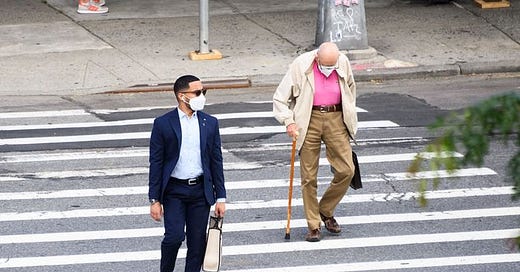Along for the Ride #132
Heya friends, happy Friday!
Little bit of book-keeping: I am looking for guest contributors for the 2022 ~Newsletter Season~. Do you know somebody who would make an amazing guest contributor? Is it you? No need to be bashful. I have a write up here about what I’m looking for and what you can expect from the process. Big fan of breaking down silos and welcoming more diverse insights into this industry, as well as learning from your bright minds, so please share / tweet / reach out.
OK, onto le news:
Government and Policy
NYC is finally getting raised crosswalks
NYC Mayor Eric Adams has announced the city will be introducing raised crosswalks, hoping to lower the number of collisions taking place on city streets. Currently intersections are where nearly 80 percent of the city’s traffic injuries happen, so this is a big win for transport advocates.
What would a future with carless cities look like?
Whispers to self: nirvana. This article considers how infrastructure funds in the US are being funneled to cities, and all the good we can do with those funds. It’s a lil too keen on Robert Moses for my liking, but if you ignore that… the piece interviews Berkeley’s Vishaan Chakrabarti about what is possible when we remove cars and make space for ✨ everything else ✨.
Sadiq Khan ups the ante with congestion charging
A new plan would see every motorist in London charged for every journey taken in London starting in 2024. The goal? Reducing carbon emissions from transport. Fully electric and other zero-emission cars would be exempt under all options—currently only 2% of vehicles on London roads are electric. This is essential to reducing emissions in the capital as achieving net zero by 2030 would need a 27% cut in car journeys. Love. to. see it.
Industry
My favourite AV company (not just because they have fed me many free lunches..) has raised a shocking amount of money this week, establishing themselves as the leading AV org in the UK. Huge congratulations to a team that has steered clear of the traditional path, very well deserved! If you’re looking for a nice team to join.. they’re hiring in London and the Bay Area :)
First hand experience of taking a Waymo minivan in Arizona
A reporter from Bloomberg news recaps their experience taking one of Waymo’s automated minivans (sans human drivers), and how in each instance they ended up requiring human assistance. Waymo has also convinced J.B. Hunt to be their first major partner in freight (TechCrunch).
WIRED’s podcast discusses the increasingly(?) near future of autonomous vehicles. The podcast includes interviews with Jody Kelman, the head of Lyft’s autonomous driving division, and Aubrey Donnellan, a cofounder and the chief operating officer at the John Deere subsidiary Bear Flag Robotics.
Research and Academia
On land use and transit network accessibility
My favourite topic. My favourite choir preaching!
“This study investigates whether access-oriented design can improve accessibility outcomes, and disentangles access benefits from network design and land use patterns. A generic superblock with two types of street network design is defined, and populated with two different land use allocation strategies. Local access is measured from transit stops… Results indicate that the land use pattern plays a vital role in the local access; however, the network configuration significantly impacts the access at the regional scale. The application of access-oriented designs in future urban growth is discussed.”
What could place-based policy look like?
Fresh research out of the Urban Institute questions how Federal policy in the US can and should shift towards a place-based approach that centres sustainable transportation.
“A new federal place-based transportation policy, framed around promoting equitable and sustainable processes and outcomes, and undertaken through partnerships, is necessary to chart a path forward. In this report, we discuss shortcomings of the current federal approach to transportation investment and propose strategies to improve it.”
The equity implications of TODs in Curitiba
Researchers have published a new article about “how socio-spatial inequalities have been shaped by transport and land-use planning in Curitiba (Brazil), a city internationally recognized for its Transit Oriented Development (TOD) planning based on Bus Rapid Transit (BRT).. The results show that Curitiba’s TOD has had limited influence on population densities, but has shaped the concentration of high-income classes and premium real-estate along its main BRT corridors. These effects contribute to the peripheralization of low-income communities with limited accessibility benefits from the transit system.”
Opinion
The most important part of dismantling highways
From Dallas where the battle for I-345 continues on. “Grace seems to agree that there are a lot of benefits to removing I-345 and replacing it with a boulevard and a reconstructed urban street grid. But he also offers a warning. Tearing down an urban highway is one thing. Making sure what replaces it is worthy of the effort is something else entirely.”
Extra Bits + Bobs
Jobs you should apply for!
New Mobility Strategist, Steer: One of my favourite teams in the biz is hiring for a new mobility strategist. I can confirm that their team appreciates sustainable + active travel and croissants, and I know we’re all looking for a bit of that in our employers ✨
That’s all from me. Have a beautiful weekend friends.
Sarah




